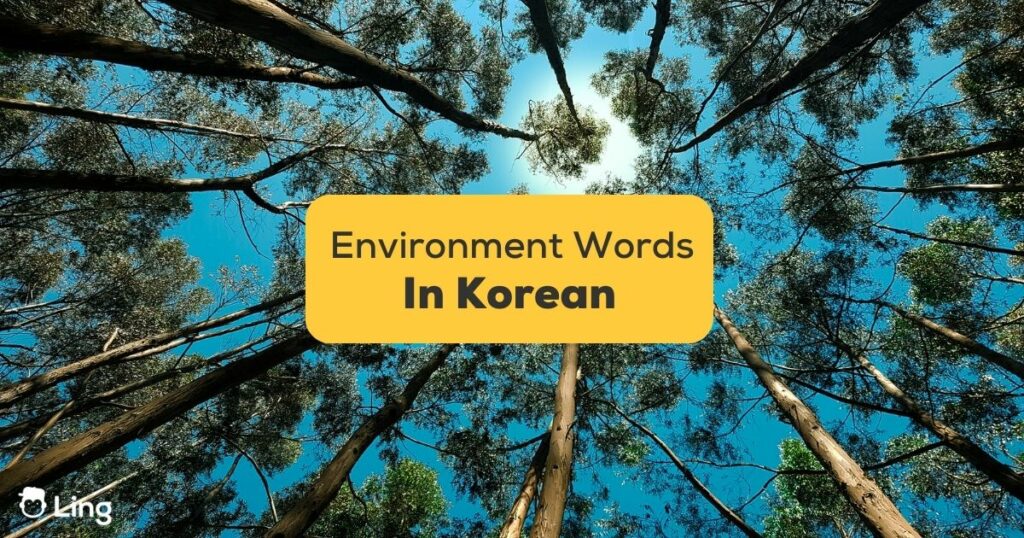Imagine you’re on a crisp morning nature walk, sipping your favorite drink, and the dazzling hues of autumn leaves are painting a symphony in your mind. In the midst of this nature wonderland, you suddenly wonder, “How would I describe all this beauty in another language?” Well, wear your learning caps because today, we’re diving into the fascinating world of Korean words for environment! Let’s begin!
What Is “Environment” In Korean?
The Korean word for ‘Environment’ is ‘환경’ (Hwan-gyeong). Yep, “환경,” just like that. No twists or turns, and definitely no tongue twisters. It’s straightforward and easy to remember, isn’t it? Try saying it out loud a few times and see how it rolls off your tongue, you linguist in the making!
However, Koreans, like English speakers, also love synonyms. We know what you’re thinking – “More words to remember, YAY!” (notice the sprinkle of sarcasm!). But don’t fret. In the spirit of edutainment, these synonyms are not only useful but fun to learn!
An alternate word for Environment is ‘주변환경’ (Ju-byeon Hwan-gyeong), which literally translates to ‘surrounding environment.’ So, the next time you talk about the environment or ‘환경,’ remember you can also use ‘주변환경.’ Fancy, right?
Another synonym you’re bound to come across on your Korean language journey is ‘생태환경’ (Saeng-tae Hwan-gyeong). This term has got a little more spice in its Korean sauce. It means ‘ecological environment.’ Just think, with this, you’re not only advocating for the environment but doing it with a touch of ecological sophistication!
Basic Korean Words For Environment
Now that you’re familiar with ‘환경’, ‘주변환경’ and ‘생태환경’, we believe you’re ready for the eco-friendly marathon of words. Buckle up, language explorers, because we’re about to go zero to sixty in your Korean environmental vocabulary.
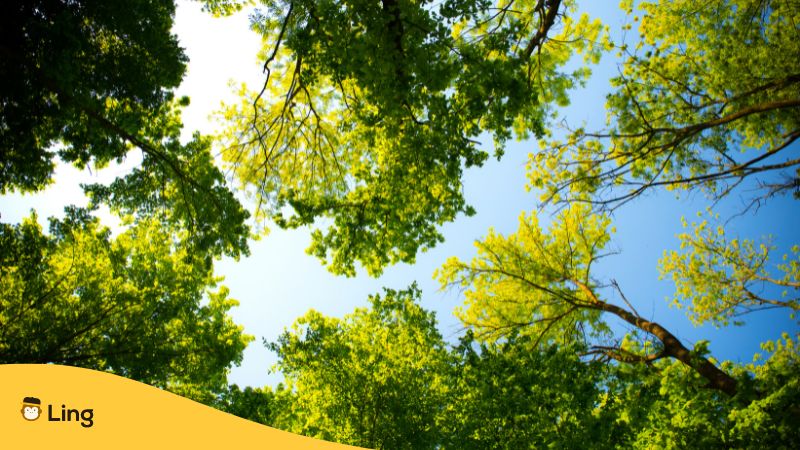
나무 (Na-mu) – Tree 🌳
Let’s start with something that’s at the ‘root’ of our environment. Literally! ‘나무’ is the Korean word for ‘tree.’ In Korean aesthetics, trees – especially the pine, bamboo, and plum trees – are considered a trilogy of beauty and resilience. They even have a term for it – ‘SongJoBi’! So, the next time you’re in a Korean forest, remember to admire the ‘나무’. Who knows? They might just whisper back some wisdom!
물 (Mul) – Water 💧
Whether you’re about to sip soju beside the beautiful Han River or just washing hands with ‘물’, remember to appreciate this life-essential. In Korean folklore, water symbolizes purity, clarity, and calmness. Intriguingly, ‘물’ also holds a significant place in many Korean idiomatic expressions. For example, ‘물다’ (Mul-da) means ‘to bite.’ Ironically, that’s some linguistic hot ‘물’!
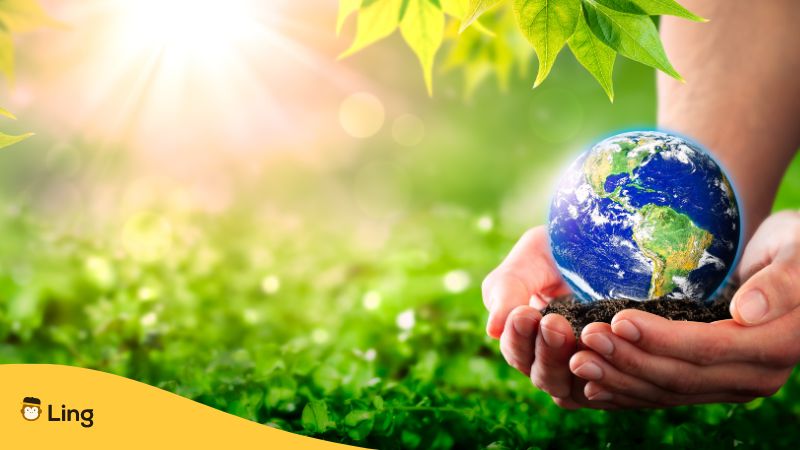
지구 (Ji-gu) – Earth 🌏
The term ‘지구’ can truly be a ‘global’ ice-breaker. If you’ve sunk your teeth into Korean culture, you must know the grand importance of Jeju Island, also known as the ‘Hawaii of South Korea.’ It’s a testament to Korea’s appreciation for ‘지구’ and its natural diversity. So, talking about our ‘지구’ with Korean friends might just get you an invite to that Jeju trip!
공기 (Gong-gi) – Air 🍃
Breathing life into our linguistic journey, quite literally, is the term ‘공기’. It’s interesting to note that air quality is a significant discussion in South Korean daily life; there’s even an app for that! So, the word ‘공기’ might find its way into several conversations. Breathe in the ‘공기’, while you talk about the ‘공기’ – quite the multitasking!
해 (Hae) – Sun ☀️
There’s something magical about the Korean sunrise, especially at Jeongdongjin Beach, popular for the breathtaking sight of ‘해’ rising above the vast ocean! When you say ‘해’, you’re talking about the fiery sphere that lights up our world and compels thousands of tourists to wake up at ungodly hours to witness its beauty in Korea.
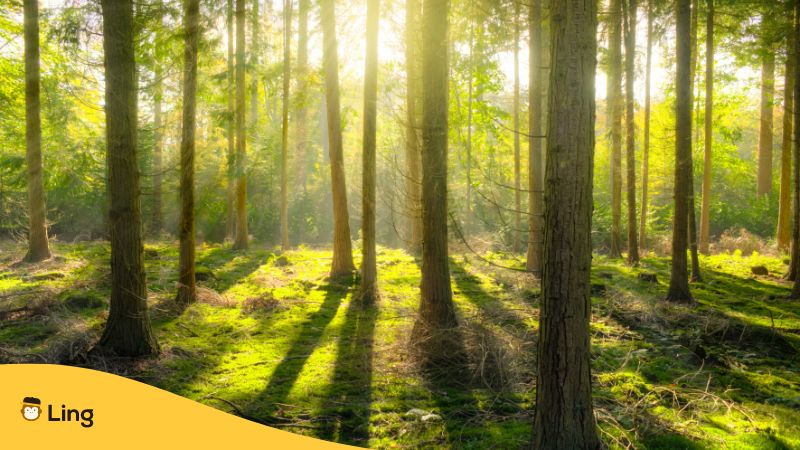
자연 (Ja-yeon) – Nature 🌿
The essence of Korean’s love for nature, or ‘자연’, is beautifully encapsulated in the traditional Korean gardens. They’re designed to co-exist harmoniously with natural landscapes, truly representing the expression ‘자연’. Combine the love for ‘자연’ with Korea’s forest bathing tradition or “Sanlimyok,” and you’ve got a natural remedy for city life’s hustle!
기후 (Gi-hu) – Climate 🌈
Representing the constant dialog about our changing world, 이 ‘기후’ is something every citizen of ‘지구’ should be talking about. In Korea, the term ‘기후’ holds central importance given the annual monsoon season and frequent typhoons. Moreover, with global concerns over climate change, ‘기후’ might be your gateway into deeper and meaningful discussions!
동물 (Dong-mul) – Animal🦒
Let’s start our new quest with our fellow inhabitants of ‘지구’ – the animals. ‘동물’ refers to the incredible array of creatures that we share this planet with. Fun fact: In Korea, animals have enriched the cultural landscape through traditional myths like the story of the rabbit on the moon (‘달 토끼’) to the well-loved Hangeul folktales. So, with ‘동물’ in your vocabulary garden, you’re all set to unleash your inner Dr. Dolittle!
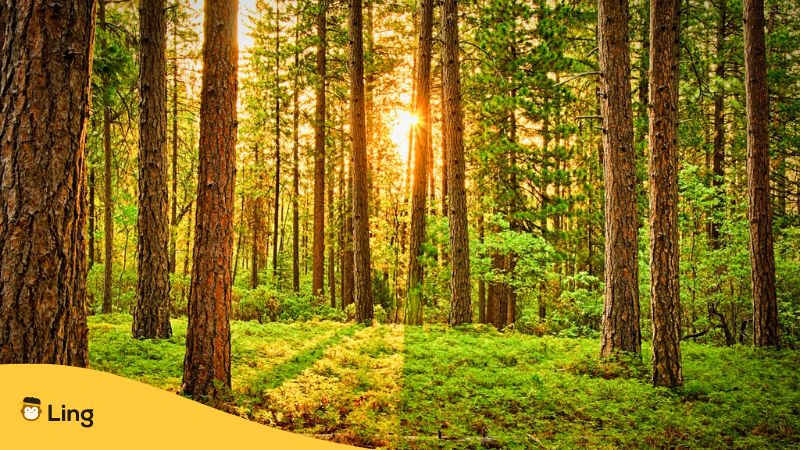
산림 (San-rim) – Forest🌲
As you journey deeper, let’s take a stroll into the heart of the wilderness with ‘산림’, which translates to ‘forest.’ For Koreans, forests are not only vital ecosystems but also places to cultivate mental and physical well-being through the practice of forest bathing. So, the next time you head out to recharge among the dense, green woods, remember to do it in Korean-style ‘산림 목욕’ (San-rim Mok-yok)!
재생에너지 (Jae-saeng Eon-eo-ji) – Renewable Energy⚡
Now, it’s time to light up your Korean language skills with the power of ‘재생에너지’, a term that stands for ‘renewable energy.’ Korea is rapidly investing in renewable energy sources like solar, wind, hydro, and geothermal power. So, get a head start in being environmentally savvy and engage in discussions about ‘재생에너지’ with your Korean pals!
기후 변화 (Gi-hu Byeon-hwa) – Climate Change🌡️
And finally, let’s tap into a global challenge that affects us all – ‘기후 변화’, a term that means ‘climate change’. As global citizens, understanding and tackling ‘기후 변화’ with joint efforts is vital. After all, ‘지구’ is our one and only home, and together, we can make a difference 다 함께 할 수 있습니다 (Da Hamkke Hal Su Iss-seum-ni-da)!
Learn The Korean Language With Ling
There you have it, eager learners! You now have 11 charismatic eco-vocabulary words ranging from the cute and cuddly ‘동물’ to the pressing matters of ‘폐기물’ and ‘재생에너지’ in Korea. Let’s spread the environmental love one word at a time. Remember, when it comes to Earth, language knows no boundaries. Happy interactive eco-speaking!
Dare to dig deeper into this language? There’s an app for that, of course! My friend, meet the Ling app!
With engaging lessons designed by native speakers and language experts, it offers a perfect blend of the basics and cultural intricacies of the Korean language. You can download this app full of 깜찍한 (cute) Korean lessons right from your App Store or Play Store. In no time, you’ll be chatting away about the importance of renewable energy, or ‘재생에너지,’ with the same ease as ordering kimchi jjigae at the local 식당 (restaurant)!
